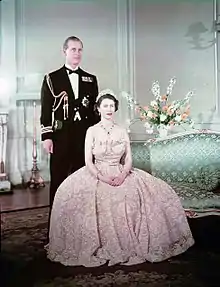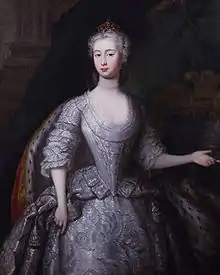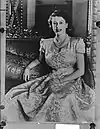Duchess of Edinburgh
Duchess of Edinburgh is the principal courtesy title held by the wife of the Duke of Edinburgh.
| Duchess of Edinburgh | |
|---|---|
.svg.png.webp) The coat of arms of Elizabeth as Duchess of Edinburgh (1947–1952) | |
 | |
| Term length | As long as married to the Duke of Edinburgh |
| First holder | Princess Augusta of Saxe-Gotha |
Duchesses of Edinburgh
The three Duchesses of Edinburgh (and the dates the individuals held that title) are as follows:
1736–1751
Princess Augusta of Saxe-Gotha was also Princess of Wales between 1736 and 1751, and Dowager Princess of Wales thereafter. Princess Augusta's eldest son succeeded as George III of the United Kingdom in 1760, as her husband, Frederick, Prince of Wales, had died nine years earlier.
1874–1900
Grand Duchess Maria Alexandrovna of Russia was the fifth child and only surviving daughter of Tsar Alexander II of Russia and his first wife Tsarina Maria Alexandrovna. She was the younger sister of Tsar Alexander III of Russia and the paternal aunt of Russia's last Tsar, Nicholas II. In 1874, Maria Alexandrovna married Prince Alfred, Duke of Edinburgh, the second son of Queen Victoria and Prince Albert; she was the first and only Romanov to marry into the British royal family. In August 1893, Maria Alexandrovna became Duchess of Saxe-Coburg and Gotha when her husband inherited the duchy on the death of his childless uncle, Ernest II, Duke of Saxe-Coburg and Gotha.
1947–1952
Elizabeth II has been Queen of the United Kingdom since her accession in 1952. Elizabeth met her future husband, Prince Philip of Greece and Denmark, in 1934 and 1937.[1] They are second cousins once removed through King Christian IX of Denmark and third cousins through Queen Victoria. After another meeting at the Royal Naval College in Dartmouth in July 1939, Elizabeth—though only 13 years old—said she fell in love with Philip and they began to exchange letters.[2] Their engagement was officially announced on 9 July 1947.[3] Before the marriage, Philip renounced his Greek and Danish titles, converted from Greek Orthodoxy to Anglicanism, and adopted the style Lieutenant Philip Mountbatten, taking the surname of his mother's British family.[4] Just before the wedding, he was created Duke of Edinburgh and granted the style His Royal Highness.[5] Elizabeth and Philip were married on 20 November 1947 at Westminster Abbey. From their marriage until her accession as queen, Elizabeth was styled "Her Royal Highness The Princess Elizabeth, Duchess of Edinburgh."
First holder, 1736
| Duchess | Portrait | Birth | Marriages | Death |
|---|---|---|---|---|
| Princess Augusta of Saxe-Gotha House of Saxe-Gotha-Altenburg (by birth) House of Hanover (by marriage) 1736—1772 |
 |
30 November 1719 Gotha, Duchy of Saxe-Gotha-Altenburg — daughter of Frederick II, Duke of Saxe-Gotha-Altenburg, and Princess Magdalena Augusta of Anhalt-Zerbst |
8 May 1736 Frederick, Prince of Wales 9 children |
8 February 1772 aged 52 |
Second holder, 1874
| Duchess | Portrait | Birth | Marriages | Death |
|---|---|---|---|---|
| Grand Duchess Maria Alexandrovna of Russia House of Romanov (by birth) House of Saxe-Coburg and Gotha (by marriage) 1874—1920 |
 |
17 October 1853 Alexander Palace, St. Petersburg — daughter of Alexander II of Russia, and Princess Marie of Hesse and by Rhine |
23 January 1874 Prince Alfred, Duke of Edinburgh 5 children |
24 October 1920 aged 67 |
Third holder, 1947
| Duchess | Portrait | Birth | Marriages | Death |
|---|---|---|---|---|
| Princess Elizabeth of the United Kingdom House of Windsor 1947—1952 |
 |
21 April 1926 Mayfair, London — daughter of George VI, and Lady Elizabeth Bowes-Lyon |
20 November 1947 Philip Mountbatten 4 children |
– now 94 years, 280 days old |
Possible future creations
It was announced in 1999, at the time of the wedding of Prince Edward, Earl of Wessex, that he would follow his father as Duke of Edinburgh. This is unlikely to happen by direct inheritance, as Prince Edward is the youngest of Prince Philip's three sons. Rather, the title is expected to be newly created for Prince Edward after it "eventually reverts to the Crown"[6] after "both the death of the current Duke of Edinburgh and the Prince of Wales' succession as King".[7] His wife, the Countess of Wessex, will become the Duchess of Edinburgh once the title gets bestowed on her husband.
References
- Brandreth, pp. 132–139; Lacey, pp. 124–125; Pimlott, p. 86
- Bond, p. 10; Brandreth, pp. 132–136, 166–169; Lacey, pp. 119, 126, 135
- Heald, p. 77
- Hoey, pp. 55–56; Pimlott, pp. 101, 137
- "No. 38128". The London Gazette. 21 November 1947. p. 5495.
- "The Earl of Wessex". Royal.gov.uk. Archived from the original on 3 December 2010. Retrieved 2010-10-30.
- Whitaker's Almanack 2010, page 46 'Peers of the Blood Royal'